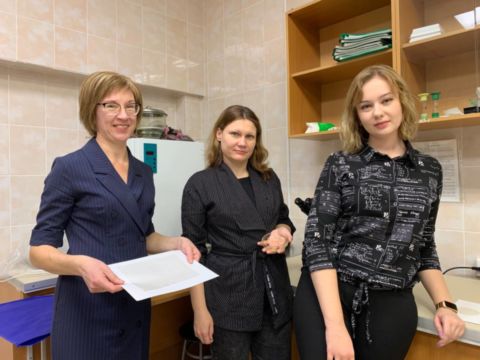Bioactive food wraps designed by scientists from the SUSU Department of Food Technology and Biotechnology decompose in soil within two weeks and help food stay fresh longer.
The structure of this biodegradable film, engineered within the frameworks of a grant by the Russian Science Foundation (RSF), includes a unique active component called protein hydrolysate. It provides the food wrap with antioxidant and antimicrobial properties, which help extend the shelf life of the product stored in it by 3 days.
“We have designed films of three different compositions: we used sodium alginate, agar-agar and pectin as structure formers, while glycerine was used as plasticizer in all films, and a unique protein hydrolysate was used as the active component,” shared Associate Professor of the SUSU Department of Food Technology and Biotechnology, project head Oksana Zinina. “Protein hydrolysate is a product of conjugate proteins breakdown into simpler components when exposed to microorganisms’ enzymes. Simply put, we “cleaved” poultry offal using caseous whey (acidic aqueous base) and added some probiotics (that are good for gastrointestinal tract) to the mix. It was proven that unique bioactive components form during hydrolysis if we combine various types of protein raw materials (poultry offal and caseous whey). As a result we have obtained the hydrolysate with active peptides in its composition, which make our wraps stronger and improve plasticity and elasticity.”
All the film variants demonstrate different degrees of the same properties, what allows to better select proper wrapping for any food products with consideration to their specifics (product’s humidity degree, its texture, or specific features of spoilage).
.png)
The scientists from South Ural State University performed an experimental research on the designed wrap using sweet cherry. The results showed that sweet cherry wrapped in the hydrolysate-containing film (unlike the common polyethylene film) was less prone to shrinkage and stayed fresh longer. This work’s results have been published in the Sustainability top-ranking journal (Q1 Scopus). At the next phase of the experiment, the researchers will study the degree of reduction in the rate of microorganisms’ growth in foods of various composition stored in such bioactive films.
Another important property of the new bioactive food wrap is that it is completely biodegradable because it is composed of natural ingredients. When exposed to moisture, natural bacteria of soil and its chemical components, the film decomposition speeds up. Within a period of just two weeks, the source material will decompose and turn into biohumus.

As a side-project, the researchers of the SUSU School of Medical Biology engineered an environment-friendly biosensor food wrap, where honeysuckle sap was used as an active component. The red-coloured juice of this berry contains anthocyanins. These are plant pigments, which can change their colour at various conditions of the medium. That is, for example, if you wrap a slab of meat in this red film, you will know that it has spoiled even before relevant signs appear on this product. The mechanics is simple: purple or grey blots will appear on the wrapping after several days – this would mean that certain chemical changes have already started to take place in the product. This change of colour in the wrapping will warn customers that the pre-packed meat has already started to spoil.
Taking into account the fact that it takes about twenty years for a plastic bag to decompose, and that the annual volume of plastic waste in Russia (as assessed by TEBIZ GROUP) equals around 10 mln. tonnes, this development by the researchers from Chelyabinsk can become an effective alternative to plastic wrapping. It has been measured that among all the polymer waste, 58% is namely the polyethylene film waste, and 17% is the polypropylene film waste.




